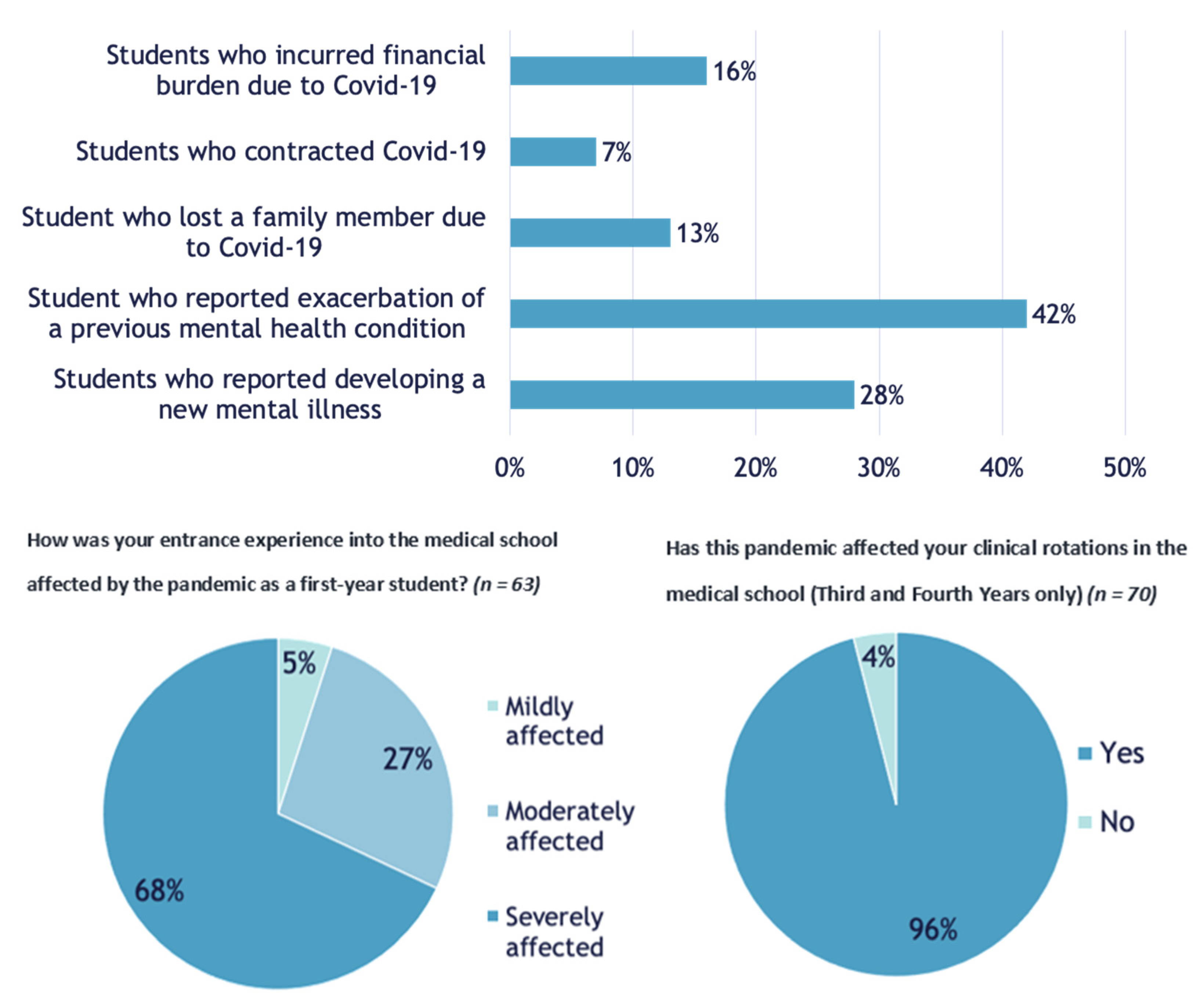Effect of COVID-19 Pandemic on Medical Students—A Single Center Study
Abstract
:1. Introduction
- In-person clinical experience training.
- In-person lectures.
- In-person small group learning during the first two years of medical education.
2. Methods
3. Results
4. Discussion
Author Contributions
Funding
Institutional Review Board Statement
Informed Consent Statement
Data Availability Statement
Conflicts of Interest
References
- Menon, A.; Klein, E.J.; Kollars, K.; Kleinhenz, A.L.W. Medical Students Are Not Essential Workers: Examining Institutional Responsibility During the COVID-19 Pandemic. Acad Med. 2020, 95, 1149–1151. [Google Scholar] [CrossRef] [PubMed]
- Newman, N.A.; Lattouf, O.M. Coalition for medical education-A call to action: A proposition to adapt clinical medical education to meet the needs of students and other healthcare learners during COVID-19. J. Card Surg. 2020, 35, 1174–1175. [Google Scholar] [CrossRef] [PubMed]
- Jumreornvong, O.; Yang, E.; Race, J.; Appel, J. Telemedicine and Medical Education in the Age of COVID-19. Acad Med. 2020, 95, 1838–1843. [Google Scholar] [CrossRef] [PubMed]
- Rolak, S.; Keefe, A.M.; Davidson, E.L.; Aryal, P.; Parajuli, S. Impacts and challenges of United States medical students during the COVID-19 pandemic. World J. Clin. Cases. 2020, 8, 3136–3141. [Google Scholar] [CrossRef] [PubMed]
- Alsoufi, A.; Alsuyihili, A.; Msherghi, A.; Elhadi, A.; Atiyah, H.; Ashini, A.; Ashwieb, A.; Ghula, M.; Ben Hasan, H.; Abudabuos, S.; et al. Impact of the COVID-19 pandemic on medical education: Medical students’ knowledge, attitudes, and practices regarding electronic learning. PLoS ONE 2020, 15, e0242905. [Google Scholar] [CrossRef] [PubMed]
- Zis, P.; Artemiadis, A.; Bargiotas, P.; Nteveros, A.; Hadjigeorgiou, G.M. Medical Studies during the COVID-19 Pandemic: The Impact of Digital Learning on Medical Students’ Burnout and Mental Health. Int. J. Environ. Res. Public Health 2021, 18, 349. [Google Scholar] [CrossRef] [PubMed]
- Essangri, H.; Sabir, M.; Benkabbou, A.; Majbar, M.A.; Amrani, L.; Ghannam, A.; Lekehal, B.; Mohsine, R.; Souadka, A. Predictive Factors for Impaired Mental Health among Medical Students during the Early Stage of the COVID-19 Pandemic in Morocco. Am. J. Trop. Med. Hyg. 2021, 104, 95–102. [Google Scholar] [CrossRef] [PubMed]
- Poluch, M.; Ries, R.; Ahmed, M. Effect of COVID-19 Pandemic on Medical Students—A Single Center Study. Am. J. Gastroenterol. 2021, 116, S1408. [Google Scholar] [CrossRef]

| Survey Question | n | % |
|---|---|---|
| Have you developed any new physical illness during this pandemic? (n = 168) | ||
| Yes | 28 | 17% |
| No | 140 | 83% |
| If you answered “yes” to the previous question, was the illness COVID-19? (n = 28) | ||
| Yes | 11 | 39% |
| No | 17 | 61% |
| Have you developed any new mental illness (e.g., anxiety, depression, stress, etc.) during this pandemic? (n = 167) | ||
| Yes | 47 | 28% |
| No | 120 | 72% |
| Has this pandemic affected your pre-existing mental illness (e.g., anxiety, depression, OCD, ADHD, etc.)? (n = 158) | ||
| Yes | 67 | 42% |
| No | 91 | 58% |
| Has this pandemic affected your study in the medical school? (n = 167) | ||
| Yes | 144 | 86% |
| No | 23 | 14% |
| If you answered “yes” to the previous question, how would you grade the severity that the pandemic has affected your study? | ||
| Mild | 47 | 33% |
| Moderate | 74 | 51% |
| Severe | 23 | 16% |
| Has this pandemic affected your clinical rotations in the medical school? (Third and Fourth Years only) (n = 70) | ||
| Yes | 67 | 96% |
| No | 3 | 4% |
| How was your entrance experience into the medical school affected by the pandemic as a first-year student? | ||
| Not affected | 0 | 0% |
| Mildly affected | 3 | 5% |
| Moderately affected | 17 | 27% |
| Severely affected | 43 | 68% |
| Have you lost a family member due to COVID-19? (n = 167) | ||
| Yes | 22 | 13% |
| No | 145 | 87% |
| Are you going through any financial burden because of the COVID-19 pandemic? (n = 167) | ||
| Yes | 26 | 16% |
| No | 141 | 84% |
Publisher’s Note: MDPI stays neutral with regard to jurisdictional claims in published maps and institutional affiliations. |
© 2022 by the authors. Licensee MDPI, Basel, Switzerland. This article is an open access article distributed under the terms and conditions of the Creative Commons Attribution (CC BY) license (https://creativecommons.org/licenses/by/4.0/).
Share and Cite
Poluch, M.; Ries, R.; Ahmed, M. Effect of COVID-19 Pandemic on Medical Students—A Single Center Study. Int. Med. Educ. 2022, 1, 11-15. https://doi.org/10.3390/ime1010004
Poluch M, Ries R, Ahmed M. Effect of COVID-19 Pandemic on Medical Students—A Single Center Study. International Medical Education. 2022; 1(1):11-15. https://doi.org/10.3390/ime1010004
Chicago/Turabian StylePoluch, Maria, Robert Ries, and Monjur Ahmed. 2022. "Effect of COVID-19 Pandemic on Medical Students—A Single Center Study" International Medical Education 1, no. 1: 11-15. https://doi.org/10.3390/ime1010004
APA StylePoluch, M., Ries, R., & Ahmed, M. (2022). Effect of COVID-19 Pandemic on Medical Students—A Single Center Study. International Medical Education, 1(1), 11-15. https://doi.org/10.3390/ime1010004






